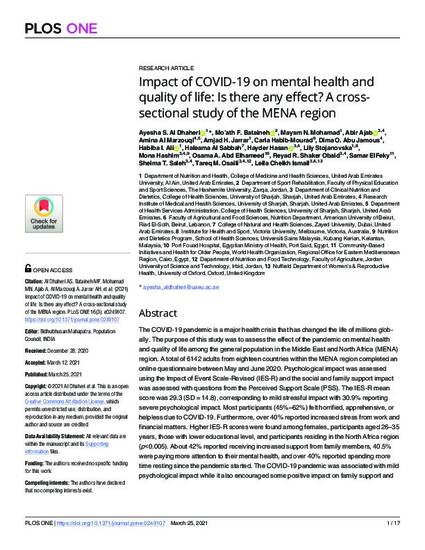
The COVID-19 pandemic is a major health crisis that has changed the life of millions globally. The purpose of this study was to assess the effect of the pandemic on mental health and quality of life among the general population in the Middle East and North Africa (MENA) region. A total of 6142 adults from eighteen countries within the MENA region completed an online questionnaire between May and June 2020. Psychological impact was assessed using the Impact of Event Scale-Revised (IES-R) and the social and family support impact was assessed with questions from the Perceived Support Scale (PSS). The IES-R mean score was 29.3 (SD = 14.8), corresponding to mild stressful impact with 30.9% reporting severe psychological impact. Most participants (45%-62%) felt horrified, apprehensive, or helpless due to COVID-19. Furthermore, over 40% reported increased stress from work and financial matters. Higher IES-R scores were found among females, participants aged 26-35 years, those with lower educational level, and participants residing in the North Africa region (p<0.005). About 42% reported receiving increased support from family members, 40.5% were paying more attention to their mental health, and over 40% reported spending more time resting since the pandemic started. The COVID-19 pandemic was associated with mild psychological impact while it also encouraged some positive impact on family support and mental health awareness among adults in the MENA region. Clinical interventions targeted towards vulnerable groups such as females and younger adults are needed.
- Pandemics,
- COVID 19,
- Mental health and psychiatry,
- Clinical psychology,
- Physical activity
Available at: http://works.bepress.com/haleama-alsabbah/1/
